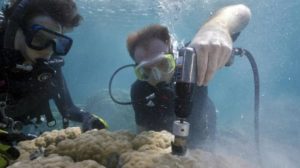by WOODS HOLE OCEANOGRAPHIC INSTITUTION, August, 28, 2020 in WUWT
Scientists have long suspected that ocean acidification is affecting corals’ ability to build their skeletons, but it has been challenging to isolate its effect from that of simultaneous warming ocean temperatures, which also influence coral growth. New research from the Woods Hole Oceanographic Institution (WHOI) reveals the distinct impact that ocean acidification is having on coral growth on some of the world’s iconic reefs.

IMAGE: WHOI SCIENTIST ANNE COHEN (LEFT) AND MIT-WHOI JOINT PROGRAM STUDENT NATHAN MOLLICA EXTRACT CORE SAMPLES FROM A GIANT PORITES CORAL IN RISONG BAY, PALAU. view more CREDIT: PHOTO BY RICHARD BROOKS, LIGHTNING STRIKE MEDIA PRODUCTIONS, PALAU.
In a paper published Aug. 27, 2020, in the journal Geophysical Research Letters, researchers show a significant reduction in the density of coral skeleton along much of the Great Barrier Reef–the world’s largest coral reef system–and also on two reefs in the South China Sea, which they attribute largely to the increasing acidity of the waters surrounding these reefs since 1950.
“This is the first unambiguous detection and attribution of ocean acidification’s impact on coral growth,” says lead author and WHOI scientist Weifu Guo. “Our study presents strong evidence that 20th century ocean acidification, exacerbated by reef biogeochemical processes, had measurable effects on the growth of a keystone reef-building coral species across the Great Barrier Reef and in the South China Sea. These effects will likely accelerate as ocean acidification progresses over the next several decades.”
Roughly a third of global carbon dioxide emissions are absorbed by the ocean, causing an average 0.1 unit decline in seawater pH since the pre-industrial era. This phenomenon, known as ocean acidification, has led to a 20 percent decrease in the concentration of carbonate ions in seawater. Animals that rely on calcium carbonate to create their skeletons, such as corals, are at risk as ocean pH continues to decline. Ocean acidification targets the density of the skeleton, silently whittling away at the coral’s strength, much like osteoporosis weakens bones in humans.
…
…
